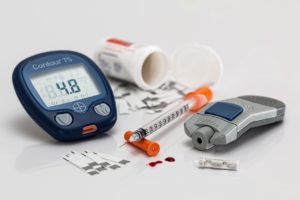Preparing for Oral Surgery
 When you have an oral surgery procedure coming up, you can make a difference in your healing and recovery by being as prepared as possible. Many people mistakenly think this only applies to people having major, full-mouth surgeries. Even something as minor as a simple tooth extraction depends on certain factors for good healing.
When you have an oral surgery procedure coming up, you can make a difference in your healing and recovery by being as prepared as possible. Many people mistakenly think this only applies to people having major, full-mouth surgeries. Even something as minor as a simple tooth extraction depends on certain factors for good healing.
Health Conditions
Let’s start with the most important factor: your overall health. Health conditions that contribute to chronic inflammation put you at risk for delayed healing from surgery.
Diabetes
 The most common health condition that affects post-surgical healing is diabetes. Uncontrolled blood sugar makes it very difficult for your body to heal normally from any type of wound or surgery. Diabetic patients have a much higher risk for post-operative complications from oral surgery, like infections and dental implant failures.
The most common health condition that affects post-surgical healing is diabetes. Uncontrolled blood sugar makes it very difficult for your body to heal normally from any type of wound or surgery. Diabetic patients have a much higher risk for post-operative complications from oral surgery, like infections and dental implant failures.
In order to prepare for oral surgery as a diabetic, it is important to work closely with your endocrinologist to achieve an excellent HbA1C state before, during and after surgery. This could involve adjusting your prescription medications or insulin dosages. It will definitely involve adhering to a strict diet. Diabetic patients who work to control their blood sugar before surgery show consistently faster and less painful healing after surgeries of all kinds.
Vitamin and Mineral Deficiencies
It is important to see your medical doctor for bloodwork prior to any surgery if you haven’t had it as part of a yearly examination. There are various mineral and vitamin deficiencies that can affect your body’s ability to heal. The good news is that if you suffer from one, they are easy to treat with supplements. The important thing is finding out that you have a problem before surgery.
Nutritional Deficiency
In addition to vitamins and minerals, it is important to have a proper nutritional intake. Studies show that protein deficiencies will also lead to delayed healing. If you eat a low-protein or vegan diet, you should speak with your doctor or a nutritionist to discuss your options for improving your protein levels before surgery.
Thyroid Problems
Patients with inappropriate levels of thyroid hormone also show delayed wound and surgical healing. If you know you have thyroid problems and have not had the hormone levels checked within the last six months, add that to your pre-operative checklist with your medical doctor. By ensuring that you have the appropriate amount of thyroid hormone before undergoing oral surgery, you improve your body’s ability to heal.
Celiac Disease
Celiac disease is an immune disease which causes the body to produce inflammation in response to the presence of gluten. This disease, when uncontrolled, can lead to problems with healing from any type of surgery. If you suffer from celiac disease, it is important to make sure that you adhere to your dietary restrictions before scheduled surgeries.
Prescription Medications – PPIs, Diuretics
 Some prescription medications also affect your ability to heal from oral surgery. Most oral surgical procedures require healing in both the bone and the soft tissues. Studies show that certain prescriptions can affect the quality of bone in a surgical site, and others lead to delayed healing in the gums. Dr. Ann and Dr. Lauren know which medications to look for. Your job is to give them a complete medical history so they can catch any potential problems prior to your surgery.
Some prescription medications also affect your ability to heal from oral surgery. Most oral surgical procedures require healing in both the bone and the soft tissues. Studies show that certain prescriptions can affect the quality of bone in a surgical site, and others lead to delayed healing in the gums. Dr. Ann and Dr. Lauren know which medications to look for. Your job is to give them a complete medical history so they can catch any potential problems prior to your surgery.
Diet
As you can see from the health conditions listed above, your diet and nutrition are extremely important to the body’s ability to heal from injuries and surgeries. Eating a healthy, balanced diet is essential to good healing. Research shows that high sugar diets can worsen chronic inflammation, which affects the healing process. Prior to surgery, you should limit your sugar intake. Cut out sweets, sodas, and candy completely. The better your diet is, the faster you will heal!
Tobacco
Nicotine constricts blood vessels and reduces blood flow to the extremities, and your gums are an extremity. Good blood flow is an essential part of the healing process, so you should eliminate all nicotine from your life two weeks prior to surgery. This includes smokeless tobacco and vaping.
The action of smoking itself is bad for oral wounds and surgical sites, no matter what you are smoking. Stop smoking cigarettes, cigars, pipes and marijuana prior to any oral surgery.
Sedation Options
It is important to consider your sedation options when anticipating an oral surgery procedure. Often, sedation creates a better working environment for your surgeon. A quicker surgery that goes very smoothly will heal faster than a difficult one. If you tend to be fidgety or anxious, discuss the sedation options available at Designer Smiles with Dr. Ann and Dr. Lauren. We are proud to offer IV sedation in our office.
More Questions about Oral Surgery?
Call Designer Smiles today to schedule a consultation with Dr. Ann and Dr. Lauren. Depending on your specific needs and medical history, we will hep you take all the necessary steps to make your surgical procedure and the healing afterward as fast and easy as possible.
